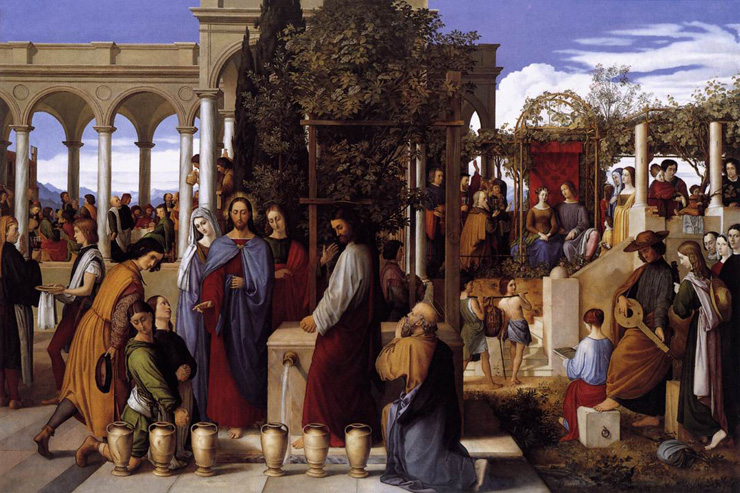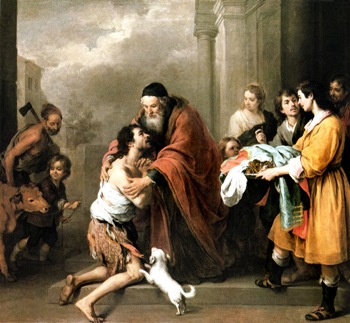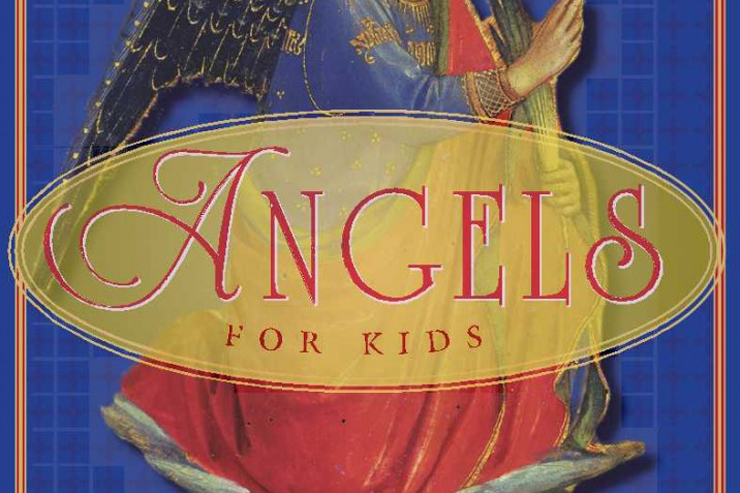Marriage is a principle and guiding theme throughout the Holy Scriptures. It is the symbol and sign of God’s sacred covenant with His people. The Creation and institution of marriage appears woven throughout the Bible, first at the beginning of Genesis and last in the book of Revelation 19:9, where it says “blessed are those who are invited to the marriage supper of the Lamb.” Christ is the bridegroom and Holy Mother Church is the bride. Christ elevated marriage to a sacrament by the Gospel message and all are invited to the wedding feast of the Lamb if they come appropriately attired. Proceeding from these truths is the fact that we must abide in and bind ourselves to the conditions and guiding principles concerning the nature of marriage revealed to us by God and confirmed by natural reason.
Marriage is so deeply significant that for His first public miracle Christ condescended to come to the Wedding at Cana and turn water into wine. With this miracle, our Lord gave an outward sign of the cherished union that exists between Him and Holy Mother Church represented by the marital bond. Christ, born from the virgin womb into the Holy Family attended a public marriage for his entrance into public life just as he had come into the world for a marriage between Himself and Holy Mother Church. Christ’s affirmation at the Wedding at Cana demonstrates the sacred union between a husband and a wife. By divine explanation of the concept, origin and sacramental nature of Holy Matrimony, we can ground questions about who can and cannot marry in their proper context of its nature as we extract them from the false grounds of desire.
THE CONCEPT OF MARRIAGE
Matrimony is a divine institution and a sacrament. The various names we use for marriage as listed in the Catechism of Trent are informative. The word “matrimony” illustrates that the woman should be disposed to become a mother “from the fact that to a mother it belongs to conceive, bring forth and train her offspring.” The word “wedlock (conjugium) points to the union of two qualified people, “because a lawful wife is united to her husband, as it were, by a common yoke.” And then there is “nuptials” as St. Ambrose witnesses “the bride veiled her face through modesty a custom which would also seem to imply that she was to be subject and obedient to her husband.” And this complemented by a husband’s duty to love, serve and protect his wife unto death.
A marriage is “the conjugal union of man and woman, contracted between two qualified persons, which obliges them to live together throughout life.” It is by design that only one man and one woman are qualified to marry. They are eligible by the appropriateness of their relationship to one another and by virtue of their complementarity endowed by the Creator. By mutual consent they agree to be joined as one flesh, faithful and monogamous, for richer or for poorer, in sickness and in health, for better for worse, until death do they part. These reflect the solemn promises concomitant with the sacred vows of the divinely instituted matrimony.
It is asserted in the Catechism of Trent that “it should be taught that matrimony is to be considered from two points of view, either as a natural union, since it was not invented by man but instituted by nature; or as a Sacrament, the efficacy of which transcends the order of nature.” It is known that by sacramental grace the two joined in marriage, if they cooperate with that grace, will not only secure their path on the narrow road to heaven, but lead an entire family to their rightful divine ends.
THE DIVINE ORIGIN OF MARRIAGE
Marriage is a creature, created by God and therefore an entity of nature with a divine origin. In the Book of Genesis 2:18 God said “It is not good for the man to be alone. I will make a suitable partner for him.” With divine purpose and intention God made Eve of Adam’s rib and Adam said: “This is now bone of my bones, and flesh of my flesh: she shall be called woman, because she was taken out of man.” It is further written of marriage: “That is why a man leaves his father and mother and clings to his wife, and the two of them become one body. The word of the Lord.” “Male and female He created them” and he instilled in them the desire to reproduce. God commanded us to “be fruitful and multiply.” Man and woman from the beginning were intended by our Creator to be joined in Holy Matrimony for life, monogamous and faithful and to procreate and educate their children.
Jesus Christ reiterates what we learn in Genesis about matrimony as he is explaining the nature of marriage to the Pharisees. We read in Mathew 19-4:6: that Christ answers them: “Have you not read that he who made them from the beginning made them male and female, and said, `For this reason a man shall leave his father and mother and be joined to his wife, and the two shall become one flesh’? So they are no longer two but one flesh. What therefore God has joined together, let not man put asunder.” This not only demonstrates further the divine origins of marriage, but confirms in unequivocal terms that marriage is perpetual and indissoluble. To summarize from paragraph 1603 of the Catechism, “the intimate community of life and love which constitutes the married state has been established by the Creator and endowed by him with its own proper laws. God himself is the author of marriage. The vocation to marriage is written in the very nature of man and woman as they came from the hand of the Creator.”
THE SACRAMENTAL NATURE OF MARRIAGE
As the Catechism explains, marriage’s “indissolubility arises principally from its nature as a Sacrament, as it is the sacramental character that, in all its natural relations, elevates marriage to the highest perfection.” Christ returned the divinely instituted ideal of Marriage to what it was intended from the beginning and He elevated it to a sacrament. The sacramental nature of marriage is well conveyed by paragraph 1645 of the Catechism where we learn that, “the love of the spouses requires, of its very nature, the unity and indissolubility of the spouses’ community of persons, which embraces their entire life: so they are no longer two, but one flesh. They are called to grow continually in their communion through day-to-day fidelity to their marriage promise of total mutual self-giving. This human communion is confirmed, purified, and completed by communion in Jesus Christ, given through the sacrament of Matrimony. It is deepened by lives of the common faith and by the Eucharist received together.”
There are three blessings that come with marriage demonstrating the fruits of its sacramental nature: children, fidelity, and sacrament. Marriage by its nature is ordered to the procreation and education of children. Children are an unmitigated blessing. They are the incarnation of the love between spouses and embody the fruitfulness of our Creator and His willingness to include us in the bounty by participation in the divine act of creation. By its nature, married love demands the sacrosanct fidelity of husband and wife. The self-donation required by the nature of marriage necessitates an unbreakable union between spouses, and this is only possible between two complementary people cooperating with grace. Fidelity amongst spouses is in imitation of God’s fidelity to His covenant. And finally, the sacramental nature of marriage demonstrates the indissolubility of the marital bond. As St. Paul said, “the Lord commanded that the wife depart not from the husband, and if she depart that she remain unmarried or be reconciled to’ her husband; and let not the husband put away his wife.” As a sacrament, the nature of marriage represents the union of Christ with His Church, perpetual and faithful.
MARRIAGE AND THE MARITAL ACT
Coming into a possession of the knowledge of the concept, origins and nature of marriage has the potential to clarify the misunderstandings surrounding marriage. By the right use of reason to accurately define our terms, we can then to proceed from those terms to develop rightly ordered premises to form proper conclusions. The questions that get answered by a consideration of the right premises revolve around “what is marriage? And “what is the marital act?” The conclusions that follow from valid premises on the nature of marriage answer the questions “who can get married? And “for whom is the marital act appropriate?”
It follows from the nature of marriage that the marital act is a means to fulfill the primary ends of marriage, the procreation and education of children. It is in the nature of the marital act that we discover its natural end in reproduction. The primary purpose of the marital act is to transmit human life by the begetting and education of children. Pope Pius XI in his encyclical Casti Cannubii paragraph 59, describes the secondary purpose of the marital act: “For in matrimony as well as in the use of the matrimonial rights there are also secondary ends, such as mutual aid, the cultivating of mutual love, and the quieting of concupiscence which husband and wife are not forbidden to consider so long as they are subordinated to the primary end and so long as the intrinsic nature of the act is preserved.” To know the nature of the marital act is to recognize its primary and secondary ends. These two ends absolutely require the faithful, monogamous and indissoluble bond of sacramental marriage in order to be fulfilled properly.
It is the right order of things both intellectually and morally to understand that action follows being. A proper response to a thing depends upon the nature of the thing. In the case of marriage, once all the aspects of its nature are clearly understood, it becomes obvious who can and cannot get married. We often hear that love, happiness or personal contentment constitute the means of a good marriage and reasons to redefine marriage, but these things are the fruits of marriage, not the nature of marriage. The good and faithful marriage can lead to love, happiness and contentment, but they can never be the means which lead lead to the good marriage.
A wise Redemptorist Priest once explained that “much of the self-pity that underlies unhappiness in marriage is due to one of two things, the victim of self-pity did not enter into marriage under God’s terms, or he did not understand what God’s terms of the marriage contract are- the most important fact to know is that the terms of marriage are not laid down by the free will of human beings, but by the authority command of God.” We are not at liberty to define marriage for ourselves. Our only choice is about whether or now we will act in accord with its nature.
Just as many have misunderstood and misused the fruits of a good marriage as the means of marriage, we can discover a similar set of circumstances surrounding the marital act. The primary and secondary purposes of the marital act are impossible outside the marital bond. The primary end of children may necessarily occur, but to the detriment of all parties from a family broken before it began. The marital act outside of marriage violates the secondary purpose because it is no help, but exacerbates every condition of the second ends. Reasons for committing to the marital act outside of the bonds of marriage are pleasure, companionship and a unity. All three are out of order and do grave harm to the souls involved.
MARRIAGE AND THE FAMILY
What is crucially necessary in this disordered age is a recovery of the recognition that the well-ordered family is the building block of civilization and sacramental marriage is the provenance of the well-ordered family. The Redemptorist priest also explained that “marriage has a necessary purpose to fulfill in society under the plan of God that cannot be fulfilled except by certain unchangeable terms and rules. God established the purpose once and for all. God has determined the rules by which the purpose is to be attained. No human being is at liberty to change either the purpose or the essential rules.” Sacramental marriage and the families that emanate from it build up society, any other alternatives do not. Properly understood, the marital act, by its nature, is primarily intended to be a participation in the divine act of creation. The natural end of the act is procreation, and the proper response to this miraculous gift is the duty to raise and educate those children within the family as a matter of justice to the Creator and to our fellow man.
Pope St. John Paul II explained that “the future of humanity passes by way of the family, indeed marriage and the family are institutions that must be promoted and defended from every possible misrepresentation of their true nature since whatever is injurious to them is injurious to society itself.” Modern society is suffering grave injury today. The strenuous and at times victorious attempts to redefine marriage speed the decay of our civilization. Broken families are the heartbreak of our age. The present crisis is about the denial of the nature of the human person, of marriage and of the marital act. Lost souls rage in vain attempts to make reality conform to them while the heavens cry out for all of us to conform to reality. Let us recover the truth about the nature of marriage and the marital act and most of the problems in our society will resolve themselves as we get on about the business of colonizing heaven.















